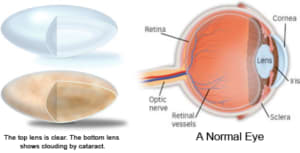Cataract Surgery
Cataracts are a normal occurrence in an aging eye: your transparent eye lens begins to cloud over with the gradual build-up of naturally-occurring proteins in the eye. Instead of allowing light to enter properly, the cloudy lens creates a foggy appearance to everything you see. This process does not happen overnight. It is typically a slow development that makes it increasingly difficult to see things clearly and perform daily tasks.
We’ve assembled comprehensive cataract information on this page to help you understand this common eye condition:
- Symptoms of Cataracts
- Types of Cataracts
- Cataract Treatment
- What to Expect During Cataract Surgery
- After Cataract Surgery
- Cataract Evaluation
- Cataract Payment Information
Symptoms of Cataracts

While cataracts are typically associated with aging, they can also occur due to disease, injury, birth defect or certain medications. Symptoms can include:
- Hazy/blurry/cloudy vision
- Glare and starbursts with night driving
- Dull appearance of colors
- Vision takes on a yellowish/brownish tint
- Eye sensitivity in bright light
Types of Cataracts
You can have a cataract in one or both eyes. The position of your cataract will affect what type of vision disturbance you have.
- Nuclear cataract: occurs in the center of the lens, often creating temporary near vision improvement
- Cortical cataract: occurs around the edges of the lens, often resulting in spoke-like opacities that move to the center of the lens
- Subcapsular cataract: occurs at the back of the lens, often masking symptoms until the later stages
Cataract Treatment in Clyde, Sylva & Waynesville, NC
While there is no cure for cataracts, cataract surgery is a very common and effective procedure to restore clear vision. You can live with cataracts for years before undergoing surgery if they are not affecting your daily life. At Mountain Eye Associates, we perform exams to assess your cataract development and we will give you the information needed to make the best decision for you regarding treatment of your cataracts with surgery.
What to Expect During Cataract Surgery
Cataract surgery is a quick outpatient procedure that can erase years of poor vision. The entire surgical process usually takes 15-20 minutes to perform. When you decide to move forward with the procedure, it’s normal to feel a little nervous. Our staff at Mountain Eye Associates understands this and will do everything we can to make you as comfortable and relaxed as possible. You will have the option of IV sedation with your surgery, along with anesthetic, placed directly around your eye with a small cannula. Our main goal is that you feel 100% confident in your surgical procedure.
Cataract Surgery Day
We will ask that you arrive 90 minutes before your surgery time to complete any necessary paperwork and have your surgical eye dilated. Your surgeon will also recheck you before going back to the operating room.
- Dilation eye drops will be placed into your eye and local anesthetics will be given. You will remain awake but lightly sedated during the procedure.
- Your doctor will use a hand-held blade to create a small corneal incision. A tiny probe will be inserted to gently break up the cloudy lens using ultrasound waves. This same tool is used to remove the lens fragments from the eye. This is called phacoemulsification.
- Through the same incision, your doctor will insert your pre-chosen replacement intraocular lens (IOL). Depending on the type of vision goals you have after surgery, you may choose a monofocal, toric, multifocal or extended depth of focus lens. The replacement lens you choose will be permanent and will feel natural in your eye. In the majority of cases no sutures are required.
- A monofocal lens will provide clear vision at one distance – most patients will need reading glasses after surgery.
- A toric lens may be recommended if you have astigmatism. These lenses can greatly improve your overall vision; glasses may still be needed for certain tasks.
- If you would like to explore the option of advanced lenses, we can discuss the benefits of the available multifocal and extended depth of focus lenses (PanOptix® and Symfony® lenses). These lenses provide high quality extended range of vision for clearer sight at distance, intermediate and near. Most patients will not need reading glasses or bifocals with one of these lenses in place.
After Cataract Surgery
After relaxing in our post-op area for a while and your doctor has visited you again, you can go home. You will need someone to drive you home after surgery so you can rest for the remainder of the day. Wear an eye shield for the first day and while sleeping as your eye heals to avoid hitting or rubbing your eye. Your vision may be a bit blurry at first and your eye may be itchy or irritated – this is normal. The prescription eye drops will help minimize discomfort. If you experience any pain or worrisome symptoms, contact our office immediately.
Only one eye is treated at a time. If you have cataracts in both eyes, your second eye can be treated after the first has healed (minimum of 2 weeks later).
Cataract Evaluation
 A cataract evaluation at Mountain Eye Associates involves several pain-free tests to determine your eye health. These cataract tests are very important to identify the presence, severity and position of any cataracts that may be affecting your vision. Plan to spend about 2 hours at our office for this evaluation.
A cataract evaluation at Mountain Eye Associates involves several pain-free tests to determine your eye health. These cataract tests are very important to identify the presence, severity and position of any cataracts that may be affecting your vision. Plan to spend about 2 hours at our office for this evaluation.
Cataract Tests
- Visual acuity test to assess your distance and near vision
- Refractive error measurement to determine your glasses prescription
- Assessment of your lenses to determine the presence of any cataracts
- Evaluation of your retinal health (back of the eye)
- Eye pressure measurement to determine the presence of glaucoma
- Review of your overall health
Depending on the outcome of these initial tests, your cataract doctor may request other testing if other eye issues are suspected. The retinal examination requires that your eyes be dilated so it is easier for the doctor to see the back of your eye. Because of this fact, you may want to have someone drive you home after your cataract evaluation.
Get Your Cataract Questions Answered
We view the cataract evaluation as a two-way communication street: we will ask you questions about how your vision is interfering with your daily activities and we encourage you to ask any questions you have about your condition and your treatment options. At Mountain Eye Associates, we are committed to providing you with as much education as possible so you can make your own informed decision about how to care for your eye health.
Cataract surgery with monofocal lenses is typically covered by insurance. If you decide to upgrade your vision with advanced technology replacement lenses, that part of your procedure will not be covered by insurance because it is considered elective.
If you want your best possible vision, we don’t want cost to stand in your way. We have several options to help make this an attainable goal for your budget:
- Cataract surgery financing: We offer financing through CareCredit®. If you qualify, you can have your advanced cataract procedure with no money down and pay for it over time with low monthly payments.
- Flexible Spending Account (FSA): If you have access to a Flexible Spending Account or Health Savings Account, you may be able to set aside pre-tax earnings to save for your procedure and ultimately end up spending less on the overall cost. There are restrictions with these plans regarding the timeframe when the money must be used, so make sure you know all of the specific rules of your plan before enrolling.
- Credit cards: We accept Visa and MasterCard.
We also accept cash and personal checks.
If you are experiencing vision changes, schedule your cataract evaluation with us today. We will take time to fully explain your condition and the options available to restore clarity to your life. Call (828) 452-5816 or schedule a cataract appointment in our Clyde, Sylva or Waynesville offices.

